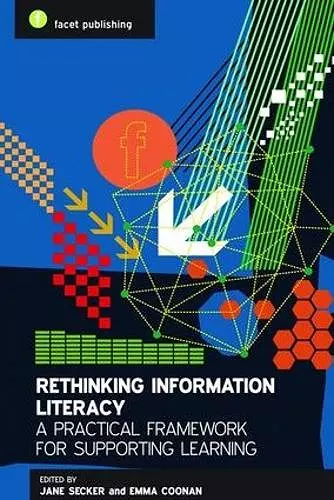Rethinking Information Literacy
A Practical Framework for Supporting Learning
Emma Coonan editor Jane Secker editor
Format:Paperback
Publisher:Facet Publishing
Published:23rd Dec '12
Currently unavailable, our supplier has not provided us a restock date

A vision for the future of information literacy teaching.
Based on groundbreaking research, undertaken by the authors as part of the prestigious Arcadia Programme at Cambridge University, this book presents a new and dynamic information literacy curriculum developed for the 21st century information professional. The authors adopt a broad definition of information literacy that encompasses social as well as academic environments and situates IL as a fundamental attribute of the discerning scholar and the informed citizen. It seeks to address in a modular, flexible and holistic way the developing information needs of students entering higher education over the next five years.
The book is organized around the ten ‘strands’ of the new curriculum, which cover the whole landscape of information literacy development required to succeed as an undergraduate in higher education. Interweaving the authors' research and the reflections of internationally recognized experts from the library, education and information literacy sectors, including Moira Bent, Andy Priestner, Sarah Pavey, Geoff Walton and Elizabeth Tilley, it illustrates how and why this new curriculum will work in practice. Detailed appendices present the curriculum, lesson plans and tools for institutional audit, giving readers all the tools they need to implement it successfully in their institutions.
"As information becomes ubiquitous and easy to access, so we – as a society – become less discerning and critically engaged with its content. This is perhaps the central paradox of the Information Age. The stakes are higher and the repercussions broader than the UK higher education context that this excellent book focuses on: the totality of our society, including its democratic principles and enlightenment ideals, is at risk when we cease to engage critically with this overflow of information. Editors Secker and Coonan issue a rallying cry to address this state of affairs, a call that is issued primarily to their fellow academic librarians. However, the stated hope is that the importance of information literacy (IL) will penetrate through the walls of the library to the lecturers, administrators and education policy makers beyond who perhaps hold more sway and are better positioned to effect change."
-- Journal of Information Literacy"…a useful and relevant update. It provides good discussions of the current state of IL, and strong arguments for strengthening of the role of librarians and the increased participation of other professionals. Its theoretical component is supported by case studies and detailed practical advice. This is recommended for those interested in information literacy and developments in this field."
-- Australian Library Journal"After reading the book, I felt I had a toolkit of really practical ideas that I could adapt to my own instructional context and start implementing straight away. The structure of the book also facilitates both detailed reading and quick reference. For instance, you can quickly dip into a relevant chapter for a refresher and some inspiration before delivering a session based around one of the strands. Perhaps one of the most valuable messages in the book however, is the need for information literacy instruction to be truly inter-professional, to the extent that the editors actively recommend passing on the book to teachers, lecturers and policy-makers. Librarians must recognise that they are not the “owners” of information literacy, and instead present it as a shared endeavour of direct relevance to the strategic objectives of the organization. Without such integration it is likely that the efficacy of our information literacy efforts as librarians will remain limited at best. This is just one reason of many why this book is an essential purchase for anyone involved in supporting learning and information skills."
-- LibfISBN: 9781856048224
Dimensions: 232mm x 157mm x 12mm
Weight: 145g
224 pages